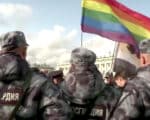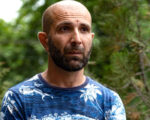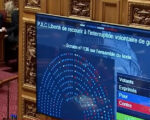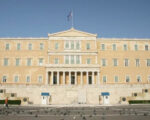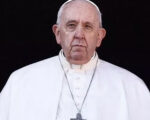>> Olympics: Any country with anti-gay laws could now be banned from hosting
Accueillie à Monaco, la 127e session du Comité international olympique a adopté à l’unanimité de ses membres, lundi 8 décembre, la recommandation 14 proposant l’inclusion de « la non-discrimination selon l’orientation sexuelle dans le sixième principe » de la Charte olympique. Il s’agit là d’une victoire pour l’ensemble des associations qui s’étaient mobilisées pour que soit garantie la protection des droits des homosexuels, après la vague de protestations qu’avait soulevée l’adoption de lois anti-gay en Russie, en amont des Jeux olympiques de Sotchi, en février.
Le principe 6 de la Charte olympique stipule que « toute forme de discrimination à l’égard d’un pays ou d’une personne fondée sur des considérations de race, de religion, de politique, de sexe ou autres est incompatible avec l’appartenance au mouvement olympique. ». L’imprécis « ou autres » était au cœur des débats et interprétations, le président du CIO Thomas Bach assurant qu’il intégrait naturellement l’orientation sexuelle. Ces deux mots sont désormais écrits noir sur blanc dans la Charte.
PRESSION HOMOPHOBES AU KAZAKHSTAN
En septembre, le CIO avait fait un premier pas dans ce sens en ajoutant une clause anti-discriminatoire dans une lettre, signée par Christophe Dubi, directeur exécutif des Jeux olympiques, envoyée aux candidats pour les Jeux d’hiver de 2022. La ville élue sera connue le 31 juillet 2015 à l’occasion d’une session du CIO à Kuala Lumpur (Malaisie). Deux sont encore en lice : Pékin et Almaty (Kazakhstan).
Or, le Kazakhstan est régulièrement épinglé par les organisations non-gouvernementales pour ses manquements au respect des droits de l’homme et notamment à ceux des homosexuels. Après avoir aboli en 1998 la loi soviétique « contre la sodomie », le pays doit adopter un nouveau code de la famille discuté au Parlement. De fortes pressions émanent d’activistes pour qu’il s’inspire des lois anti-gays de la Russie interdisant la « propagande » homosexuelle.
En octobre, un tribunal d’Almaty a infligé une amende de 180 000 dollars à l’agence de publicité Havas Worldwide Kazakhstan qui avait réalisé pour un bar gay, le studio 69, une affiche sur laquelle s’embrassaient (à la russe) le compositeur kazakh Kurmangazy Sagyrbayuly et le poète pétersbourgeois Alexandre Pouchkine.
>> The Olympics has taken a huge step forward in protecting gay rights.
The International Olympic Committee (IOC) approved Proposal 14 of the Olympic Agenda 2020 to include non-discrimination with regard to sexual orientation in Principle 6 at a vote in Monaco today (8 December).
Principle 6 originally read: ‘Any form of discrimination with regard to a country or a person on grounds of race, religion, politics, gender or otherwise is incompatible with belonging to the Olympic Movement.’
With sexual orientation included, it implies that countries with laws that actively discriminate against gay people will not be able to apply to host. It must be noted the IOC remains unclear whether this decision will affect any future bids.
It comes after several people were arrested during the Sochi Olympics earlier this year, held in the shadow of Russia’s ‘gay propaganda’ laws.
‘Today is a great step forward for the Olympics, and particularly for the athletes, spectators, and residents of host countries who identify as gay, lesbian, or bisexual,’ said Human Rights First’s Shawn Gaylord.
‘Our hope is that potential host countries, like Kazakhstan and China, will understand that protecting the rights of sexual minorities is no longer something they can dodge.
‘We call on the IOC to continue its efforts to support equality by including gender identity in Principle 6 as well.’
‘It sends a clear message to future host cities that human rights violations, including those against lesbian, gay, bisexual, and transgender people, will not be tolerated,’ said Andre Banks, co-founder and executive director of All Out.
‘These new rules must prevent a replay of Sochi.’
The 2016 Summer Olympics will be held in Rio De Janeiro, Brazil, and in Tokyo, Japan in 2020. The 2018 Winter Olympics will be held in Pyeongchang, South Korea. The next host city to be decided will be the 2022 Games, with Almaty, Kazakhstan and Beijing, China as the only two candidates.
avec source : Bruno Lesprit
Journaliste au Monde





